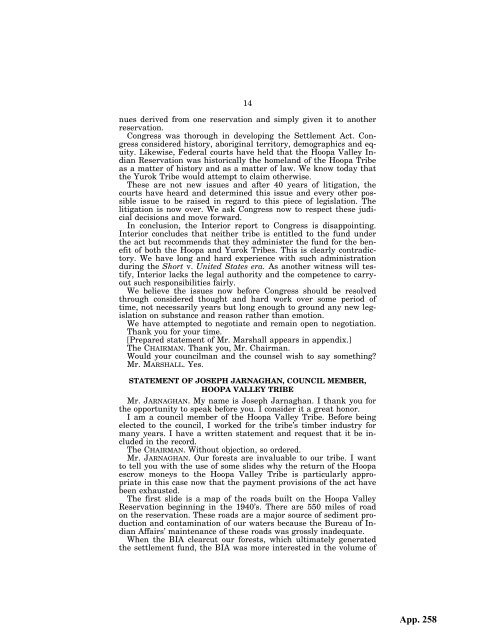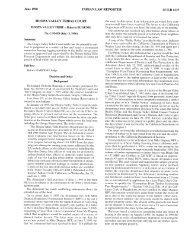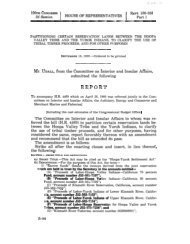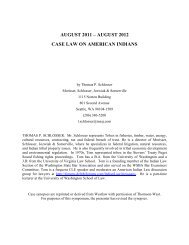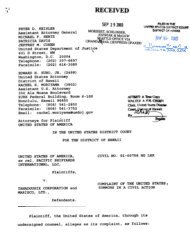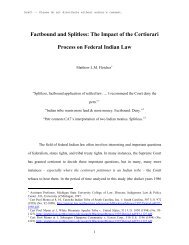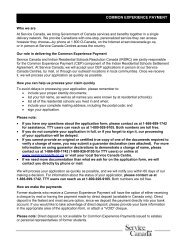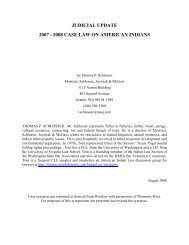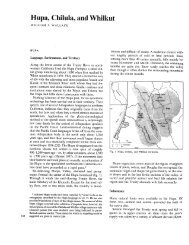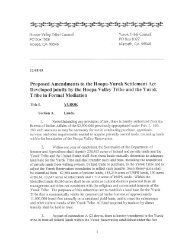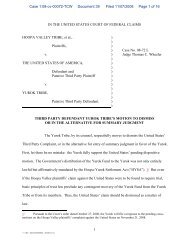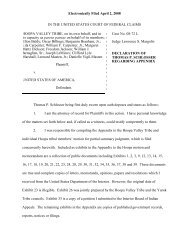Hoopa appendix supporting summary judgment - Schlosser Law Files
Hoopa appendix supporting summary judgment - Schlosser Law Files
Hoopa appendix supporting summary judgment - Schlosser Law Files
You also want an ePaper? Increase the reach of your titles
YUMPU automatically turns print PDFs into web optimized ePapers that Google loves.
14<br />
nues derived from one reservation and simply given it to another<br />
reservation.<br />
Congress was thorough in developing the Settlement Act. Congress<br />
considered history, aboriginal territory, demographics and equity.<br />
Likewise, Federal courts have held that the <strong>Hoopa</strong> Valley Indian<br />
Reservation was historically the homeland of the <strong>Hoopa</strong> Tribe<br />
as a matter of history and as a matter of law. We know today that<br />
the Yurok Tribe would attempt to claim otherwise.<br />
These are not new issues and after 40 years of litigation, the<br />
courts have heard and determined this issue and every other possible<br />
issue to be raised in regard to this piece of legislation. The<br />
litigation is now over. We ask Congress now to respect these judicial<br />
decisions and move forward.<br />
In conclusion, the Interior report to Congress is disappointing.<br />
Interior concludes that neither tribe is entitled to the fund under<br />
the act but recommends that they administer the fund for the benefit<br />
of both the <strong>Hoopa</strong> and Yurok Tribes. This is clearly contradictory.<br />
We have long and hard experience with such administration<br />
during the Short v. United States era. As another witness will testify,<br />
Interior lacks the legal authority and the competence to carryout<br />
such responsibilities fairly.<br />
We believe the issues now before Congress should be resolved<br />
through considered thought and hard work over some period of<br />
time, not necessarily years but long enough to ground any new legislation<br />
on substance and reason rather than emotion.<br />
We have attempted to negotiate and remain open to negotiation.<br />
Thank you for your time.<br />
[Prepared statement of Mr. Marshall appears in <strong>appendix</strong>.]<br />
The CHAIRMAN. Thank you, Mr. Chairman.<br />
Would your councilman and the counsel wish to say something<br />
Mr. MARSHALL. Yes.<br />
STATEMENT OF JOSEPH JARNAGHAN, COUNCIL MEMBER,<br />
HOOPA VALLEY TRIBE<br />
Mr. JARNAGHAN. My name is Joseph Jarnaghan. I thank you for<br />
the opportunity to speak before you. I consider it a great honor.<br />
I am a council member of the <strong>Hoopa</strong> Valley Tribe. Before being<br />
elected to the council, I worked for the tribe’s timber industry for<br />
many years. I have a written statement and request that it be included<br />
in the record.<br />
The CHAIRMAN. Without objection, so ordered.<br />
Mr. JARNAGHAN. Our forests are invaluable to our tribe. I want<br />
to tell you with the use of some slides why the return of the <strong>Hoopa</strong><br />
escrow moneys to the <strong>Hoopa</strong> Valley Tribe is particularly appropriate<br />
in this case now that the payment provisions of the act have<br />
been exhausted.<br />
The first slide is a map of the roads built on the <strong>Hoopa</strong> Valley<br />
Reservation beginning in the 1940’s. There are 550 miles of road<br />
on the reservation. These roads are a major source of sediment production<br />
and contamination of our waters because the Bureau of Indian<br />
Affairs’ maintenance of these roads was grossly inadequate.<br />
When the BIA clearcut our forests, which ultimately generated<br />
the settlement fund, the BIA was more interested in the volume of


